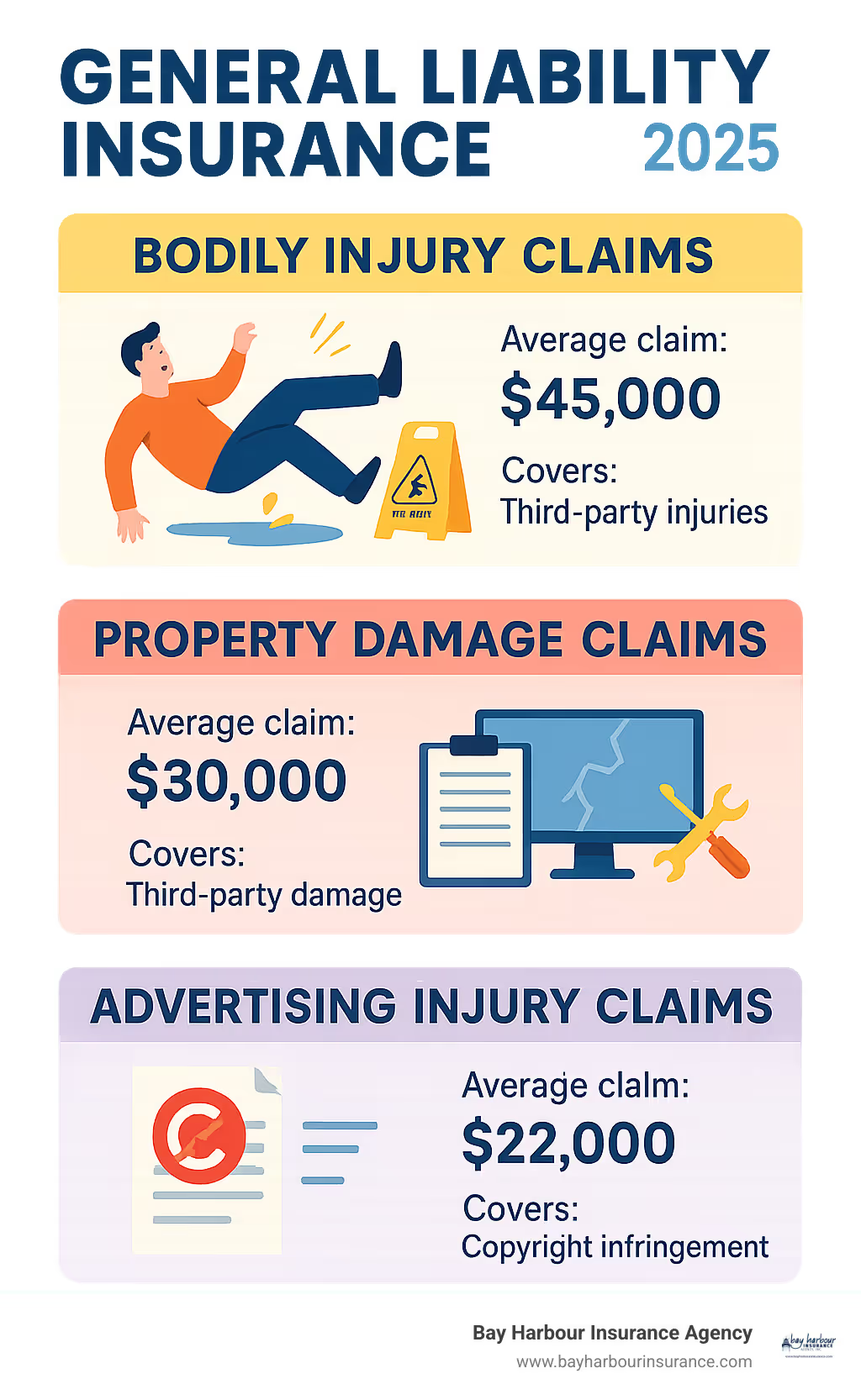
A Comprehensive Guide to General Liability for Business Owners
August 29, 2025
Your First Line of Defense in Business
General liability insurance for business owners protects your company from third-party claims of bodily injury, property damage, and personal injury that could otherwise bankrupt your business. This essential coverage acts as your financial shield when customers, clients, or visitors file lawsuits against your company.
Here's what you need to know about general liability insurance:
- What it covers: Bodily injury, property damage, personal and advertising injury, medical payments, and legal defense costs
- Average cost: Starting around $500 annually for small businesses, varying by industry and risk factors
- Who needs it: Nearly every business that interacts with customers, clients, or the public
- Key benefit: Covers legal fees and damages even if you're not at fault
As a business owner, you face risks every day. A customer could slip on your wet floor. Your employee might accidentally damage a client's expensive equipment. Your marketing campaign could lead to a copyright infringement claim.
Unfortunately, passion and commitment cannot prevent accidents.
These situations happen more often than you think. Trip-and-falls are Canada's leading cause of injury hospitalization, and similar patterns exist across North America. Even the most careful business owners can find themselves facing expensive lawsuits.
General liability insurance in Long Island doesn't just pay for damages - it covers your legal defense costs regardless of whether you win or lose the case. For Long Island business owners operating in today's litigious environment, this coverage isn't optional. It's your business survival plan.

Decoding General Liability: What It Is and What It Covers
Picture this: you're running your business on a busy Tuesday morning when suddenly, everything changes. A customer trips over a loose carpet edge, or your employee accidentally spills coffee on a client's laptop. These moments can turn expensive fast.
That's where Commercial General Liability (CGL) insurance comes to the rescue. Think of it as your business's financial bodyguard against third-party claims - those lawsuits that come from people who don't work for you but interact with your business.
General liability insurance for business owners covers three main areas that could otherwise drain your bank account. Bodily injury coverage handles the medical bills and legal costs when someone gets physically hurt on your property or because of your business operations. Whether it's a customer slipping on your freshly mopped floor or a visitor tripping over equipment, this coverage has your back.
Property damage coverage kicks in when your business accidentally damages someone else's stuff. Maybe your delivery driver backs into a client's fence, or your cleaning crew knocks over an expensive vase. These things happen, and this coverage makes sure you're not paying out of pocket.
The third piece - personal and advertising injury - protects against non-physical harm. This includes libel and slander (saying or writing false things about someone), copyright infringement (using someone's protected material without permission), and other reputation-damaging claims. These lawsuits are becoming more common.
Your policy also covers medical payments for minor injuries, even when you're not at fault. This small gesture can prevent bigger lawsuits down the road. Plus, legal defense costs are covered regardless of whether you win or lose the case - and trust us, legal fees add up quickly.

Real-World Claim Examples
Sometimes the best way to understand general liability insurance for business owners is through real stories. These scenarios happen more often than you might think.
A customer slips on a wet floor at your retail store and breaks their ankle. They file a lawsuit seeking medical expenses and compensation for lost wages. Your general liability coverage handles their medical bills, your attorney fees, and any settlement costs.
An employee damages a client's laptop during a service call while setting up new software. The laptop contains important business data, and the client demands compensation for the equipment and data recovery. Your property damage coverage steps in to cover the replacement and recovery costs.
A marketing campaign leads to a defamation lawsuit when your ad accidentally uses copyrighted music or implies negative things about a competitor. The personal and advertising injury portion of your policy covers your legal defense and potential settlement.
A product causes property damage when your bakery's special cake causes an allergic reaction, leading to emergency room visits and a lawsuit. Your coverage handles the medical payments and legal costs associated with the claim.
These examples show why having solid protection matters. Even the most careful business owners face unexpected situations, and general liability insurance for business owners ensures you're ready when they happen.
The Financial Side: Cost of General Liability Insurance for Business Owners
One of the first questions we hear from Long Island business owners is, "How much will general liability insurance for business owners actually cost me?" It's a completely reasonable concern, especially when you're already juggling so many expenses to keep your business running.
Here's the good news: general liability insurance is more affordable than most business owners expect. The average annual cost of a general liability policy can start at around $500 for a small business, though your actual premium will depend on your specific situation.
Think of it this way - for less than what many businesses spend on office supplies in a year, you can protect yourself from lawsuits that could cost tens of thousands of dollars. When you put it in that perspective, it's really a bargain for the peace of mind it provides.
The reality is that every business is different, which means every quote is different too. A small consulting firm in Patchogue will have very different insurance needs than a busy restaurant in Bay Shore. That's why we always recommend getting a personalized quote rather than trying to guess based on averages. You can start the process with a Business Insurance Quote Long Island to see what your specific business might pay.
Key Factors That Influence Your Premium
Insurance companies are essentially professional risk assessors. They look at your business and try to predict how likely you are to file a claim. The higher the perceived risk, the higher your premium will be. But don't worry - this isn't personal! It's just math based on decades of data.
Your industry and risk level plays the biggest role in determining your premium. A construction company faces different risks than a bookkeeping service, and the premiums reflect that reality. If your business involves heavy machinery, lots of foot traffic, or working in people's homes, you'll typically pay more than a business that operates primarily online or in a low-risk office environment.
Where your business operates on Long Island can also affect your costs. Areas with higher population density or more lawsuit activity might see slightly higher premiums simply because there's more potential for claims to occur.
The size of your operation matters too. More employees generally means more activity, which can increase the chances of an accident happening. Similarly, businesses with higher annual revenue typically have more customer interactions and operations, which translates to more exposure.
Your claims history is like your business's report card when it comes to insurance. A clean record with no past claims will help keep your premiums lower, while a history of claims will likely increase your costs. Insurance companies view past claims as a strong predictor of future ones.
The coverage limits you choose have a direct impact on your premium. Higher limits mean more protection for your business, but they also mean higher costs. We always recommend purchasing as much coverage as you can comfortably afford - it's much better to have it and not need it than the other way around.
Finally, your deductible choice can help you manage costs. A higher deductible will lower your premium, but it means you'll pay more out of pocket if you do have a claim. Most businesses find that deductibles in the $500 to $1,000 range strike a good balance between manageable premiums and reasonable out-of-pocket costs.
Understanding these factors helps you make smart decisions about your coverage and potentially find ways to manage your insurance investment more effectively.
General Liability vs. Professional Liability: Knowing the Difference
Picture this: you're a contractor who accidentally damages a client's expensive hardwood floor while installing new fixtures. That's a general liability situation. Now imagine you're a financial advisor who gives investment advice that leads to significant client losses. That's where professional liability comes into play.
The key difference? General liability insurance for business owners protects against physical mishaps and tangible damage, while professional liability shields you from claims related to your professional expertise and advice.
General liability is all about the physical world. When someone gets hurt on your premises, when your employee accidentally breaks a client's laptop, or when your business operations cause property damage - that's general liability territory. It covers the bumps, bruises, and broken items that can happen in day-to-day business operations.
Professional liability, however, lives in services and advice. It kicks in when clients claim your professional work caused them financial harm. Maybe you're an accountant who made an error on tax returns, or a web developer whose coding mistake cost a client thousands in lost sales. These situations don't involve physical injury or property damage, but they can be just as costly.
Many Long Island business owners need both types of coverage. If you're a consultant who visits client offices, you need general liability for potential slip-and-falls, plus professional liability for your advice. The same goes for IT professionals, architects, and many service-based businesses.
For more detailed information about protecting your professional services, check out our guide on Secure Business Professional Liability.

Comparing General vs. Professional Liability
Here's how these two essential coverages stack up:
Common exclusions for general liability insurance for business owners
While general liability insurance for Long Island business owners covers a lot of ground, it's important to understand what it doesn't cover. These exclusions exist because other specific policies handle these risks better.
Employee injuries are the biggest exclusion. If your employee gets hurt on the job, that's covered by Workers' Compensation insurance, not general liability. This separation makes sense because workplace injuries have different legal requirements and benefit structures.
Commercial auto accidents need their own coverage too. If your delivery driver causes an accident while making deliveries, your commercial auto policy handles that claim, not your general liability policy.
Intentional damage is never covered. Insurance protects against accidents and negligence, not deliberate harmful acts. If you intentionally damage someone's property or harm someone, you're on your own financially.
Damage to your own business property requires commercial property insurance. General liability only covers damage you cause to other people's property, not your own building, equipment, or inventory.
Understanding these exclusions helps you build a complete insurance program that truly protects your Long Island business from all angles.

